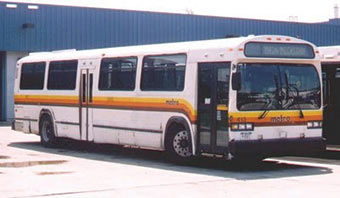Will the NFTA Listen to its Customers?
by Aaron Lowinger

When all the smoke of a game-changing service cut proposal had cleared, and the public furor it caused quieted, the NFTA was left with the diesel soaked rags and a book of matches in the form of the second significant fare hike in three years. Of course the NFTA has been quick to deny that the proposed service reduction was a threat designed to make a fare hike more palatable, but many riders still smell the fumes when they think of the NFTA and its Board of Commissioners.
And it was out of that toxic air, amid a multitude of voices from riders and elected officials, that the NFTA threw the public a bone. At its February board meeting, they announced the development of a Citizens Advisory Panel (CAP), a non-voting entity that could nonetheless provide a novel thing for the NFTA: the voice of the people who actually ride the bus. Currently, the board is functionally deaf to the experience of its customers. In the Board’s monthly public meetings, there is no allotted time for the public to speak or comment. For a business-heavy Board, they have ignored the number one rule of business: customer service.
As it now stands, even if CAP were formed, they would finally be able to bring customer issues to the Board’s oblong table. But the strength of their voice would ultimately be tempered by their lack of voting power.
“It’s shameful that they wouldn’t have a vote,” regionalism and NFTA advocate Kevin Gaughan said when the CAP was first discussed. “I would suggest that they not waste their time in building such a committee. Until a commissioner sits on the Board, the Board will never understand the issues.”
There are currently two bills originating in the State Assembly to create additional non-voting commissionerships on the NFTA Board. One, from Crystal Peoples-Stokes, calls for two non-voting commissioners to be appointed by the Mayor of Buffalo and its Common Council, but the bill appears stuck in neutral. Another bill penned by Sen. George Maziarz and Assemlymember Robin Schimminger that calls for a “second non-voting member to the Niagara Frontier transportation authority who shall represent the transit dependent or disabled community” (the first non-voting member is Vince Crehan, who is the president of the Amalgamated Transit Union Local 1342), has started to move through the legislature.
Perhaps the NFTA is waiting on the fate of that bill before they create the CAP, because they’ve offered no new information on the matter since it was first announced five weeks ago. It was then described as an “advisory panel” that “will not be a part of the actual governing Board, but rather act in an advisory capacity to help Metro become more responsive and better meet the needs of its customers. It will function in a capacity similar to our current Advisory Committee on the Disabled.”
Once a month, a small slice of the disabled community meet in the “West Room” off the cafe of the downtown library to convene the Advisory Committee on the Disabled, a forum begun sometime in the wake of the Americans with Disabilities Act (ADA) of 1990. I arrived early last week and sat between two gentlemen. On my right was Donald LaBer, who told me the NFTA “get a lot of input from this.” On my left was Rich Marino, who dismissed the Committee, saying “they mostly just like to pat themselves on the back.”
At the outset there were about a dozen committee members and five NFTA employees from various offices, including the Director of Surface Transportation, Tom George, who came late, excused himself on a phone call halfway through, and then left early. “He can be kinda condescending,” I was told of George.
By and large, the NFTA staff were respectful and responsive to the concerns of the committee. ADA Coordinator Colleen Clancy listed some of the committee’s recent accomplishments: no more colors on paper bus schedules (as many visually-impaired riders found them difficult to read), directives to have drivers call out stops and transfers, and a new green space at the airport for guide dogs.
If the NFTA can be forced to respond to its customers so it can be in compliance with federal legislation, perhaps there’s room to hope it could do the same if either of the bills in the Assembly pass and the CAP is formed. But what would it mean to not have a vote? We’ll look at that next.
blog comments powered by Disqus|
Issue Navigation> Issue Index > v11n14 (Week of Thursday, April 5) > Week in Review > Will the NFTA Listen to its Customers? This Week's Issue • Artvoice Daily • Artvoice TV • Events Calendar • Classifieds |









 Current Issue
Current Issue